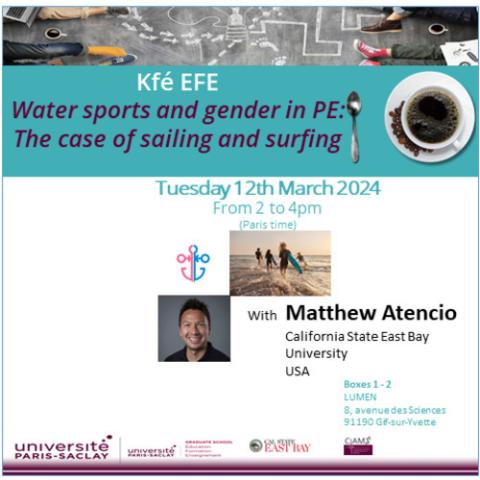
Kfé EFE, Water sports and gender in PE: The case of sailing and surfing
Kfé EFE
Water sports and gender in PE: The case of sailing and surfing
Our work provides a sociological analysis of the gender and social class practices underpinning school-based surfing and light sailing in France and California.
In this school-based water sport context, these two international school systems reproduce different conceptions and practices of equality due to the specific historical, political and social characteristics of each context. These differences exist despite both locations having similar laws and concerns when it comes to ensuring equality for all students in terms of access to nautical culture, and then more fundamentally in regard to students' integration and social success.
The qualitative analysis, combining interviews and ethnographic observations, highlights the socialization experiences of youth, parents, and school program supervisors, which crucially reflect the impact of gender and social class as these factors determine the production and/or maintenance of inequalities.
Furthermore, these stakeholder involvements also indicate the complex interaction of certain social dispositions. Masculine domination characterizes the gendered social relationships between young people in the distribution of surfing waves and tasks within the sailing boat's crew, and this domination also fits with the competitive and performative objectives pursued by supervisors and parents. However certain actors resist this domination, and even redefine these gendered social relationships in some cases, giving the perception of a more egalitarian practice of water sports.
Références from the guest speaker, Matthew Atencio (California East Bay University, USA), and the co-organiser, Anne Schmitt (CIAMS, Université Paris-Saclay) :
- Schmitt, A., Atencio, M. & Curschella, M. (2024), « It’s a bit tough when you’re just trying to have fun”: Gendered practices of school sport surfing in France and California. Sport, Education & Society
- Schmitt, A., Atencio, M., Sempé, G. (2021). “If I’m sailing with a girl, I get identified as a ‘marshmallow’”: Gendered practices of school sport sailing in Western France and California, International Review for the Sociology of Sport. 56(1) : 114-132
Kfé EFE
Water sports and gender in PE: The case of sailing and surfing
Our work provides a sociological analysis of the gender and social class practices underpinning school-based surfing and light sailing in France and California.
In this school-based water sport context, these two international school systems reproduce different conceptions and practices of equality due to the specific historical, political and social characteristics of each context. These differences exist despite both locations having similar laws and concerns when it comes to ensuring equality for all students in terms of access to nautical culture, and then more fundamentally in regard to students' integration and social success.
The qualitative analysis, combining interviews and ethnographic observations, highlights the socialization experiences of youth, parents, and school program supervisors, which crucially reflect the impact of gender and social class as these factors determine the production and/or maintenance of inequalities.
Furthermore, these stakeholder involvements also indicate the complex interaction of certain social dispositions. Masculine domination characterizes the gendered social relationships between young people in the distribution of surfing waves and tasks within the sailing boat's crew, and this domination also fits with the competitive and performative objectives pursued by supervisors and parents. However certain actors resist this domination, and even redefine these gendered social relationships in some cases, giving the perception of a more egalitarian practice of water sports.
Références from the guest speaker, Matthew Atencio (California East Bay University, USA), and the co-organiser, Anne Schmitt (CIAMS, Université Paris-Saclay) :
- Schmitt, A., Atencio, M. & Curschella, M. (2024), « It’s a bit tough when you’re just trying to have fun”: Gendered practices of school sport surfing in France and California. Sport, Education & Society
- Schmitt, A., Atencio, M., Sempé, G. (2021). “If I’m sailing with a girl, I get identified as a ‘marshmallow’”: Gendered practices of school sport sailing in Western France and California, International Review for the Sociology of Sport. 56(1) : 114-132
